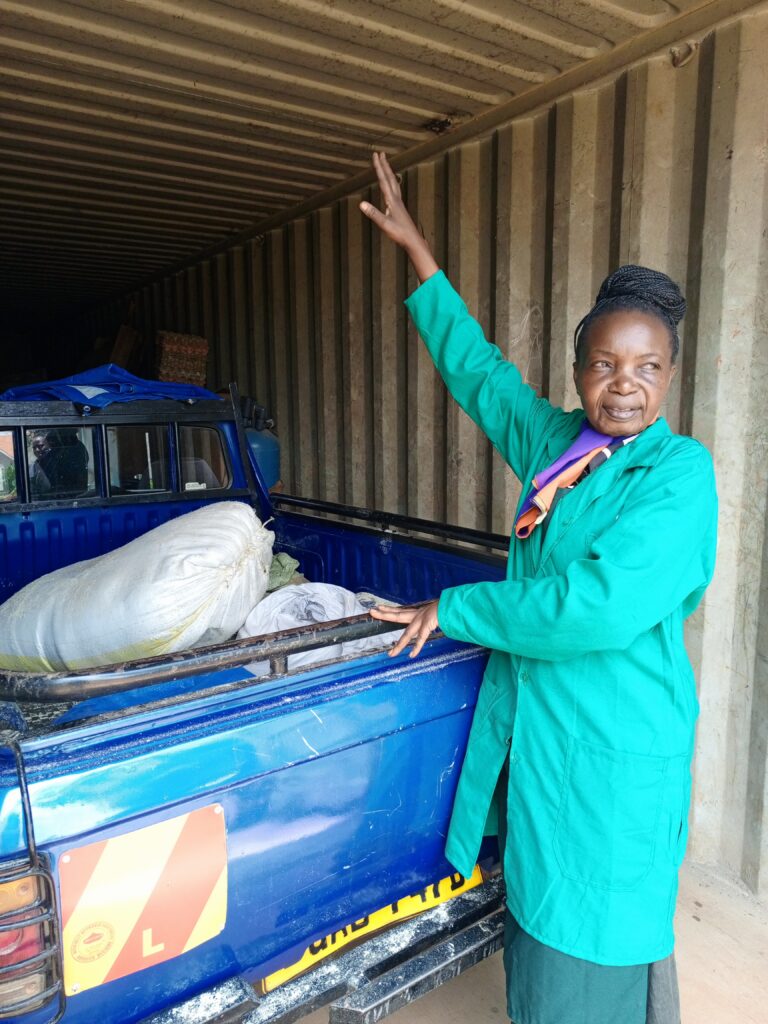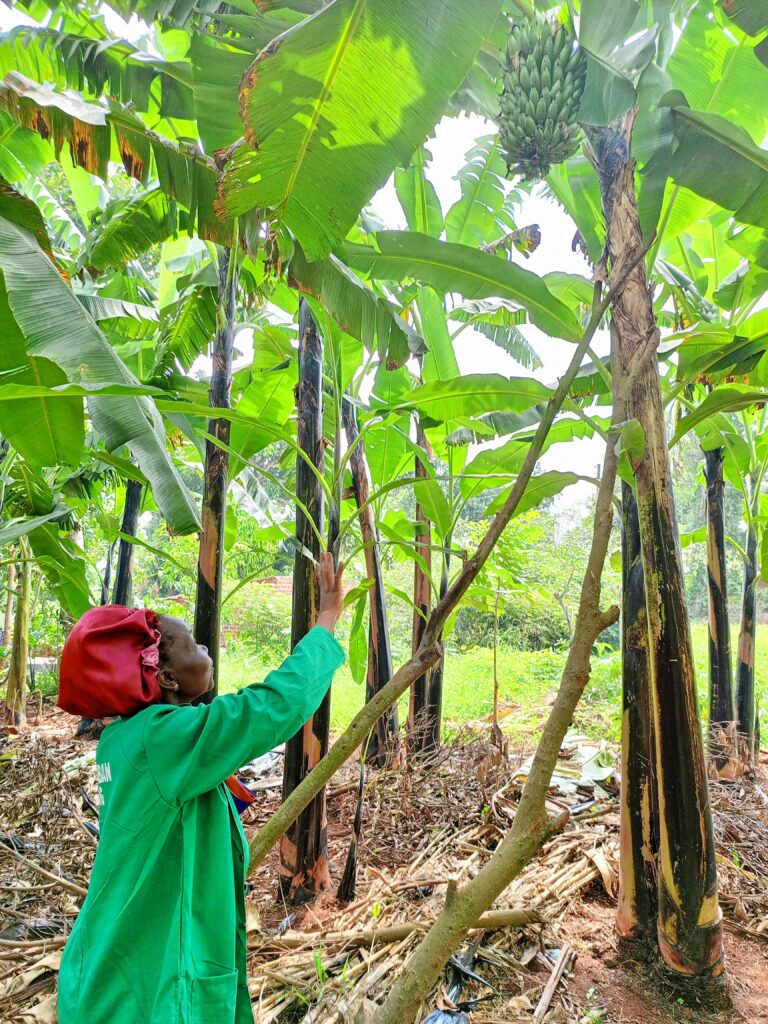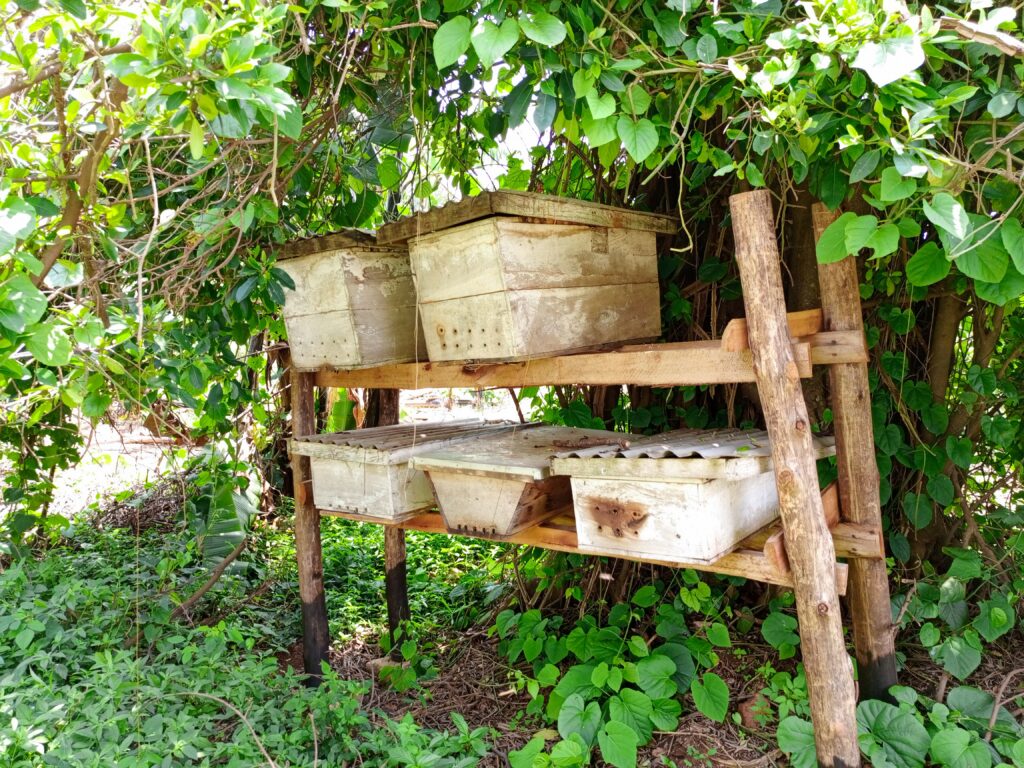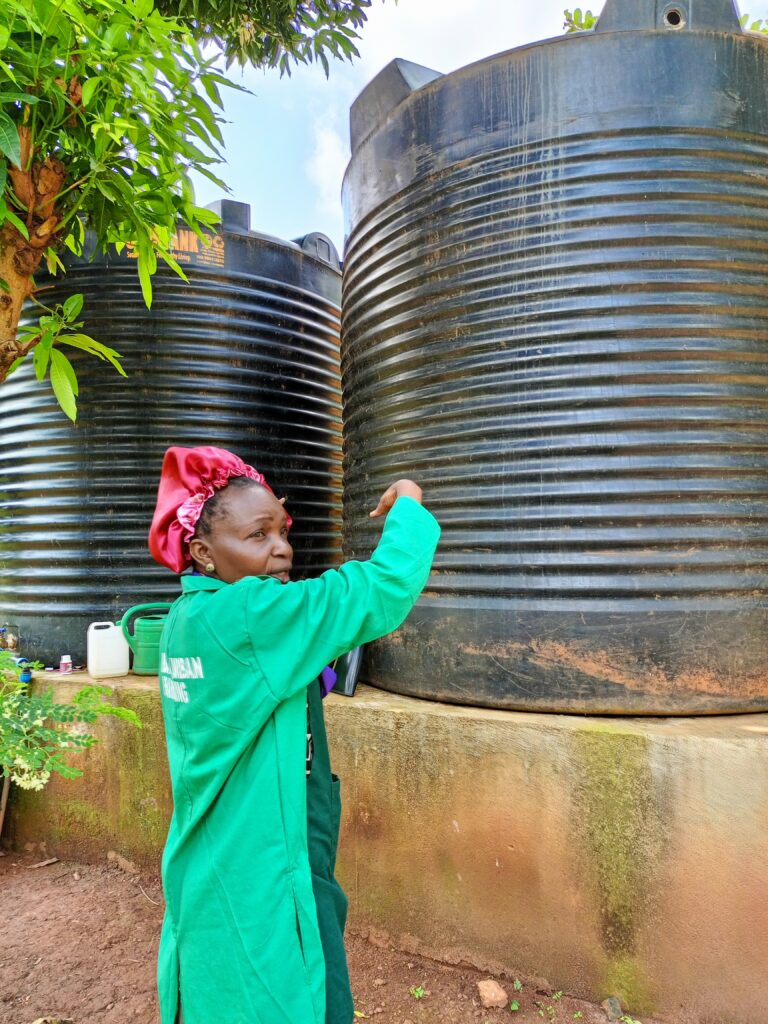By Vision Reporter
Jane Nalukwago is a farmer whose hunger and thirst for farming knowledge is insatiable. Before she embarked on her farming journey, she attended various trainings, travelling around the country to visit successful farmers who excel in the projects she wanted to do. Her sojourns took her to places such as Mbarara and Bushenyi, in western Uganda, where she visited farmers making a killing from bananas (matooke), dairy cattle and other such projects. She also learned from the various Harvest Money expos and trainings at Namboole, where she cultivated contacts that helped her improve the farm.
But what eventually prompted Nalukwago to plunge in fully was a visit to Bashir Mayiga’s massively successful passion fruit farm in Kalungu district. Mayiga, one of the first winners of New Vision’s Harvest Money competition, had inspired many farmers to follow in his shoes with his rags to riches story.
“We visited Mayiga’s Bwasandeku Mixed Farm in 2016 and were inspired by everything we saw,” she says. Nalukwago and her sister Annet Namuddu left Mayiga’s farm invigorated. They had purchased a piece of land, slightly larger than three acres, several years earlier, but it had been lying idle, used to grow sweet potatoes and cassava on a subsistence scale. With renewed passion and vigour, they went all in, investing heavily in clearing the land, purchasing fertilisers and other inputs, buying poles, wires and nets to trellis the passion fruits on, costing them about sh10m in all. They started with 5,000 grafted seedlings purchased from Mayiga’s Bwasandeku farm in 2017.
The first four seasons produced a bountiful harvest for Nalukwago, in 2018, 2019 she was making more than sh5m from passion fruit sales per year. Their was ready market everywhere for the delicious purple passion fruit variety they had planted. But the fifth season was an unmitigated disaster. Encouraged by the fruitful bumper harvests, the sisters had decided to expand their passion fruit operations. Just when they had invested heavily into expanding the passion fruit acreage, opening up new gardens, a strange disease ravaged passion fruit farms around the country, and Nalukwago’s was not spared. She lost all her crops and all attempts to remedy the situation were futile. She took her soils for testing and tried different pesticides and fungicides, but the passion fruit plants could not be brought back to life.
“The fortunate few passion fruit farmers whose gardens survived the outbreak raked in millions as the price of a bag of passion fruits went up to sh1.5m,” Nalukwago recalls.
Like any determined farmer, the setbacks were not enough to deter Nalukwago, they simply fuelled her fire. She used these as learning points and decided to diversify into other agricultural enterprises instead of relying on only one crop.
Today, Nalukwago runs a modern intensive mixed farm called Gubala in Sekiwunga, Kitende, Wakiso district adjacent to the Entebbe expressway. The urban farm specialises in matooke and piggery. In addition, the farm also grows vegetables such as tomatoes, green pepper, sukuma wiki, ntula, nakati as well as crops such as beans and coffee. The farm also has food crops such as sweet potatoes, maize, yams, cassava, which are sold, eaten by the workers, and also used to feed the animals; no part of the plant goes to waste.
The farm also maintains an orchard of avocadoes, mangoes, pawpaws, jackfruit, oranges and passion fruits. Nalukwago explains that with the successful harvests from all the projects going on in the farm, her family does not have to buy food for home consumption or for the farm workers.
Nalukwago harvests 800 kilogrammes of maize each season; most of which is used to feed the animals and workers on the farm.
The deep attachment to agriculture stems from their background; Nalukwago and Namuddu were born into a farming family, and crops such as coffee and matooke paid their school fees. “My father had cattle and large plantations and was one of the first clonal coffee farmers in Masaka,” Namuddu says. When the sisters returned to farming when they were older, they decided to do things differently from her forefathers. They decided to go at it the modern way, applying the best agronomic practices acquired from the numerous trainings they had attended. Nalukwago and Namuddu were running a successful hardware business in Kansanga. They invested a large chunk of the proceeds from this business, as well as savings from Namuddu’s job as a civil servant into the farm, putting up a permanent bungalow that would house their first farm worker. Namuddu says she used to enjoy reading Harvest Money and it was the first thing she would go to in the newspaper every Friday. She was especially inspired and challenged by stories of urban farmers who were optimising space that was much smaller than hers. The farm started with ginger, because it is a high yielding crop that can be grown intensively on a small scale to produce a lot. At the time they planted it, a bag of ginger was going for sh800,000, but by the time they harvested it, the price had fallen to sh250,000. “Ginger is an intensive crop, we had invested so heavily into taking care of it, yet we earned little from it,” Namuddu says.
Piggery
Though the farm has livestock such as poultry, goats and rabbits; Nalukwago’s pride and joy is her modern piggery. One of the impressive things about her farm is how it employs technology to improve efficiency and ease work around the facility. Two 20,000 litre tanks harvest and store rainwater which is piped directly to an automated nipple drinking system in each pigsty, supplying each hog with a constant supply of fresh clean drinking water 24/7. According to National Agricultural Advisory Services (NAADS), a farmer should budget about 150 litres of water a day for each sow. This would be backbreaking work if a farmer had to ferry this water to each pig on the farm manually.

The piggery parlours are modern with tiled floors and concrete feeding troughs that are easy to scrub.
Benjamin Kalungi, who is in charge of the piggery, says his daily cleaning ritual starts as early as 7:00am where he sweeps, rakes and scrapes waste from each pig’s unit. A thorough scrubbing of the pig parlours is conducted thrice a week using disinfectant to sterilise all units. This prevents the buildup of bacteria, parasites and other disease causing agents that may lead to the spread of zoonotic infections such as salmonella.
The urine and manure is collected and left to ferment for a few days before being channelled to the banana plantation, keeping the matooke stems healthy, even during the driest of spells, to the envy of all who visit the farm.
The runoff water and urine from the piggery is piped into the banana plantation, a form of fertigation (irrigating using water mixed with fertiliser for optimal results).
Nalukwago has trenches in her banana plantation which guide water through it and trap it exactly where it is needed.
In order to minimise the use of antibiotics and protect her farm from the much-feared swine flu, Nalukwago keeps a disinfectant footbath at the entrance of her livestock section as a biosecurity control measure. Visitors have to dip their feet into it before accessing her piggery.
Thinking big, starting small
Nalukwago started her piggery in March 2021 with only three piglets. This was after attending several piggery trainings that left her feeling she was ready to dive into the enterprise full scale. She built two executive suites, spending about sh8m, before she resorted to fairer wooden walls and stone concrete filled floor units. She spent a further sh1.6m on plumbing all the units to ensure each pig has access to multiple drinking points.
Nalukwago then bought two young Camborough sows that were three months old; each cost her sh250,000. From a different farm she acquired a six-month-old purebred boar at sh700,000. One of the sows died before giving birth, the other had eight piglets – four females and four males. The male piglets were castrated to fatten them for sale.
The surviving females grew to adulthood and gave birth to several more, multiplying her farm. Today she has more than 22 pigs, with a number of sows gestating. Nalukwago uses artificial insemination to maintain superior genetics from studded boars. She has also acquired F1 Large White pig which grows much faster than other breeds in the country, putting on up to 135 kilogrammes in six months. She sells each two-month-old piglet at sh250,000 and the price goes up each extra month as they grow bigger. The adults are sold for slaughter when they attain a weight of more than 100 kilogrammes with each going for sh10,000. This means she makes more than sh1m per pig. Nalukwago stresses that the piggery business is highly profitable and the demand is endless, if one can find a way to minimise the feeding costs.
Kalungi, the piggery manager, explains that to attain the desired weight, he feeds the swine three times a day – a 9:00am breakfast comprising formulated hog feed, a 1:00pm sumptuous lunch of greens such as sweet potato vines, yam leaves and other vegetation harvested from the farm and a 5:00pm supper of bran, maize, mukene fish, soya, cottonseed cake, salt, premix and concentrate.
Like any piggery, Nalukwago’s biggest challenge is how to minimise the cost of feed to maximise profit. To reduce the cost of livestock feed, Nalukwago has planted some trees of calliandra whose flowers will have the additional benefit of providing nectar for the bees in her apiary. In a bid to further diversify her farm, Nalukwago ‘imported’ a trainer from Bushenyi who took her workers through the entire process of beekeeping. The farm hopes to make its first sweet harvest of honey this year.
She has also secured three other acres to plant elephant grass and maize to make silage for her livestock and to sell to other farmers.
A plantation to die for
In 2019, Nalukwago picked interest in commercial matooke farming. Matooke is a treasured staple for the sisters, as Masaka natives. Nalukwago scoured the country, visiting successful farmers who were harvesting matooke on ‘square miles’. On returning, she put into practice the best principles she had mastered. She cleared a section of her land and dug holes two feet deep, three feet long and two feet wide. As she dug the holes, she put the loam soil to one side and the red soil on another.
She bought two ‘Elf’ trucks of cow dung for manure. A basin of this manure was mixed with loam soil to apply to each hole. The mixture was then left to cure for a week, after which the suckers were planted. After six months, Nalukwago bought another truck full of manure which was applied in a ring around each banana plant, two feet from the stems.
In her banana plantation, Nalukwago cultivates indigenous varieties which have a high demand on the market such as Nakimbe, bogoya, gonja, ndiizi, mbwa zilume and kisansa.

Nalukwago says many who come to her farm admire how healthy her plantation is and leave with suckers which she sells at sh2,000 each. She stifles weed growth and maintains moisture in her soil by mulching with different organic matter such as elephant grass, maize stalks, leaves of various trees and grasses that also improve the fertility of the soil as they break down. One of the better kept secrets to her lush plantation is human urine, rich in vital nutrients such as nitrogen, phosphorus and potassium which revitalises the soil. Bananas are heavy feeders and before she had acquired pigs, Nalukwago used human urine to keep them replenished. “We have made it a principal in our entire family to gather our urine carefully without adding any water to it,” Nalukwago says. Nalukwago then collects the urine in one container, where it is left to ferment for three weeks. It is then mixed with about 0.5 kilogrammes of ash, and three kilogrammes of fine charcoal dust to regulate the PH. The charcoal dust acts as a cooling agent, which supplies potassium.
“When the mixture is ready for application, we stir thoroughly with a stick,” Nalukwago says. “Before applying, we measure 1.5 feet from the stem and pour around it one litre of the urine mixture,” she adds. Now, she mostly uses a mix of pig urine and ash which also acts as an organic pesticide.
Challenges
One of the challenges Nalukwago faces is the high cost of animal feeds. Though she has amassed a decade’s worth of knowledge under her belt, Nalukwago is still learning voraciously. In order to further cut on her feeding costs, she is learning to breed black soldier fly larvae which she will then process and serve to the livestock – a rich source of protein and fat.
Nalukwago at one point struggled to find reliable workers. One time, her trusted employees left the farm without notice. She had to quickly find part-time workers. Nalukwago solved this challenge by employing trusted, loyal and reliable relatives, such as her brother William Sejjengo who runs the horticulture department of the farm.
Nalukwago has also had to deal with trespassing stray animals, such as chicken and free range swine from the neighbourhood. In addition to destroying her plantation, these also bring with them the threat of disease. In order to prevent neighbours’ livestock from straying onto her property, and to curb theft, Gubala has fenced off the farm using proceeds from its produce. “We opened up a bank account for the farm, and we use the profits to keep improving the property,” Nalukwago says.
The future
Nalukwago has big plans for the future of Gubala farm and they are contained in a file that welcomes visitors in the office of the farm, along with other documentation such as farm records, receipts, training manuals and a large visitors’ book. The farm, registered under Gubala Investments, is highly organised, with a clear vision and mission statement which meticulously spells out the farm’s goals, objectives and aspirations both long and short term.
Her immediate goal is to add friesian cows to the farm. These will not only further diversify her income streams, but also provide fresh dairy products to the community around her. Nalukwago also plans to add value to her pork, by processing sausages, burgers, and barbecuing on site.
For her bananas, she wants to explore the export market.
Nalukwago’s farm is located on a prime area between the Entebbe highway and the expressway to the airport. She plans to make full use of this location by growing her farm into an ecotourism destination drawing visitors from far and wide to stay in her cottages and bask in the greenery. The cottages will also accommodate visitors who come to learn about modern agriculture on her model demonstration farm.
Namuddu says they plan to continue expanding the range of activities on the farm. “I want it to be a one stop shop for all sorts of herbs and spices such as celery, mint, rosemary and so many more,” she says. “I also want us to have a bigger impact on the community around, especially the women. I want to encourage them to take on urban farming in any kind of space they have, be it compounds or backyards,” Namuddu adds. This will help ensure food security for their families as well as provide an additional source of income.

Getting market
Nalukwago harnesses the power of social media to network with other farmers. She is a member of a number of farmers’ Whatsapp groups, and these platforms enable her get immediate market for her products. The farm also markets its produce through the community radio in the area, and through family, friends, church members and so on (warm marketing). Nalukwago endeavours to attend as many trade shows and agricultural exhibitions as possible and through these she gets to promote her products and interface with others in the agricultural sector. Last but not least, Nalukwago’s farm has a pick up truck which she uses to ferry fresh items to market for sale. The farm is strategically located close to estates such as Akright and members of these estates come directly to Gabula’s gardens to buy fresh vegetables, bananas and other produce.
Achievements and social impact
Gubala has managed to interest the community to adopt modern farming methods. “When we bought this land, many people in the area used to wake up, drink [alcohol] and mostly idle,” Namuddu says. “But we gradually started to encourage them to come to the farm for gainful employment,” she adds. Some neighbours were inspired and gained interest to start engaging in farming seriously. The farm provided these with training, suckers and seedlings to start them off. “The area is now much more developed than it was and we have running water and electricity,” Namuddu says.
One of the farm’s objectives is to continue promoting this community development through trainings in efficient farming methods and appropriate nutrition. In order to make nutritious products more accessible, Gubala provides quality products to the immediate community at a lower price. For example a bunch of matooke that she sells upmarket at sh40,000, she sells to less well to do neighbours at sh12,000 or sh15,000.

What others say
Edwin Balirwa, farmer
I started working with Gubala farm in 2020, when it still had good looking passion fruits. I admired the farm’s smart workers. I was only 22 years and needed a job, so I offered to market their passion fruits. Getting market for the passion fruits was easy, the fruits were on high demand, people always bought the passion fruits very fast at a good price. With my savings, I hired a small piece of land in Kitende and started growing passion fruits. Gubala farm offered me seedlings and guided me through the planting and harvesting seasons. I continued marketing Gubala’s passion fruits as I tended to my passion fruit garden. We both had good yields and good sales. Time reached when I had many seedlings and needed more land so I left Kitende. Now, I grow passion fruits on an acre of land along Mityana road. I sell a 200 kilogramme bag of passion fruits at sh800,000 or sh900,000 and half a bag (100kg) at sh400,000 or sh450,000 depending on the season. There is a lot of money in passion fruits. Gubala farm gave me suckers to start a banana plantation and I am now seeking guidance from Nalukwago on how to start a piggery project.
Maxy Nalubwemba, businesswoman
As a neighbour to Gubala, I admire how this farm has connected us. It has brought the neighbourhood together. I got to know the workers of the farm three years ago, from then on our relationship has bloomed. The farm workers teach me all about how to cultivate what I buy. I am also informed about the animals and the farm produce prior to harvest, giving me enough time to prepare to buy before it is taken further upmarket.
Susan Nakiganda, housewife
I am thankful to Gubala farm for granting my sons part-time jobs, this income greatly helps our family. They are called to do odd jobs from weeding, harvesting, loading, and offloading. They return with cash and plenty of free vegetables and fruits. I always pray that Gubala farm develops and gets more activities so that my sons have work to earn from. Many young people in the neighbourhood look forward to working in the farm.
Josephine Nanyonga a nurse
I have seen Gubala farm grow through the seasons. I learnt a lot from the farm as Gubala farm not only sells me their produce, but also teaches us how it grows and its requirements. At times, they give me free vegetables such as greens, ntula tomatoes, and avocadoes. I regard the farm workers highly for their generosity in knowledge and produce. I plan to start up a farm in my newly acquired land and feel grateful to be close to a neighbour who I can look up to for improved farming techniques.





